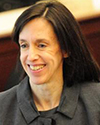Question A:
September 2023 was the 25th anniversary of the collapse of Long-Term Capital Management (LTCM). In response to LTCM's troubles, the Federal Reserve orchestrated a multi-billion dollar rescue package by a consortium of banks and it cut the Federal funds rate target by 75 basis points within six weeks.
The hedge fund sector's contribution to systemic risk is substantially lower today than at the time of LTCM.
Responses
Responses weighted by each expert's confidence
Question B:
Financial market participants' expectation that the Fed will aggressively ease monetary policy in response to financial market dislocations is a substantial source of financial instability.
Responses
Responses weighted by each expert's confidence
Question A Participant Responses
| Participant | University | Vote | Confidence | Bio/Vote History |
|---|---|---|---|---|
 John Campbell |
Harvard | Bio/Vote History | ||
|
|
||||
   John Cochrane |
Hoover Institution Stanford | Bio/Vote History | ||
|
The question presumes LTCM was a "systemic risk," not clear. "Systemic risk" means a system wide run on short term debt, not that someone might lose some money. Only if HF have a lot of short financing, and failures could infect others, would it be such a risk. Not clear.
|
||||
   Francesca Cornelli |
Northwestern Kellogg | Did Not Answer | Bio/Vote History | |
|
|
||||
   Douglas Diamond |
Chicago Booth | Bio/Vote History | ||
|
Prime brokers require much more information from funds than they did from LTCM.
|
||||
   Darrell Duffie |
Stanford | Bio/Vote History | ||
|
The impact on systemic risk is mainly through the banking system. Banks have been forced by regulation to reduce their exposure to hedge funds. There is still significant risk, but substantially less than during the days of LTCM.
-see background information here |
||||
   Janice Eberly |
Northwestern Kellogg | Did Not Answer | Bio/Vote History | |
|
|
||||
   Xavier Gabaix |
Harvard | Bio/Vote History | ||
|
|
||||
   Itay Goldstein |
UPenn Wharton | Bio/Vote History | ||
|
|
||||
   John Graham |
Duke Fuqua | Bio/Vote History | ||
|
|
||||
   Campbell R. Harvey |
Duke Fuqua | Bio/Vote History | ||
|
I think important lessons in risk management were learned in 1998. While risk is lower, risk is not eliminated. To be clear, there are many sources of systemic risk such as our banks - not just hedge funds.
|
||||
   David Hirshleifer |
USC | Bio/Vote History | ||
|
|
||||
   Harrison Hong |
Columbia | Bio/Vote History | ||
|
Cumulatively more financial regulations today than in the past in developed liquid markets.
|
||||
   Wei Jiang |
Emory Goizueta | Bio/Vote History | ||
|
|
||||
   Steven Kaplan |
Chicago Booth | Bio/Vote History | ||
|
|
||||
   Anil Kashyap |
Chicago Booth | Bio/Vote History | ||
|
|
||||
   Ralph Koijen |
Chicago Booth | Bio/Vote History | ||
|
|
||||
   Camelia Kuhnen |
UNC Kenan-Flagler | Bio/Vote History | ||
|
|
||||
   Andrew Lo |
MIT Sloan | Did Not Answer | Bio/Vote History | |
|
|
||||
   Michelle Lowry |
Drexel LeBow | Bio/Vote History | ||
|
|
||||
   Sydney Ludvigson |
NYU | Bio/Vote History | ||
|
|
||||
   Matteo Maggiori |
Stanford GSB | Bio/Vote History | ||
|
The hedge fund sector has expanded and is still largely unregulated. Much of it has moved offshore, Cayman Islands, or in onshore/offshore financial centers like Luxembourg and Ireland. Its levered positions recently contributed to US treasuries volatility and the UK LDI crisis.
|
||||
   Gregor Matvos |
Northwestern Kellogg | Bio/Vote History | ||
|
|
||||
   Tobias Moskowitz |
Yale School of Management | Bio/Vote History | ||
|
Short answer: we don’t know. Hedge funds are such a diverse group and their financing’s connection to the broader economy is opaque.
|
||||
   Stefan Nagel |
Chicago Booth | Bio/Vote History | ||
|
Due changes in regulation after the financial crisis, prime brokers are less willing to extend financing with extreme leverage/little collateral; counterparty risk and collateral management has improved.
|
||||
   Jonathan Parker |
MIT Sloan | Bio/Vote History | ||
|
Because hedge funds are funded with equity from endowments, wealthy investors, etc., they are not a direct source of systemic risk. But losses by banks that lend to them and sell them derivatives can be systemic. I think the current banking sector is better managed and regulated.
|
||||
   Christine Parlour |
Berkeley Haas | Did Not Answer | Bio/Vote History | |
|
|
||||
   Thomas Philippon |
NYU Stern | Bio/Vote History | ||
|
|
||||
   Manju Puri |
Duke Fuqua | Did Not Answer | Bio/Vote History | |
|
|
||||
   Michael R. Roberts |
UPenn Wharton | Bio/Vote History | ||
|
|
||||
   Paola Sapienza |
Northwestern Kellogg | Did Not Answer | Bio/Vote History | |
|
|
||||
   Amit Seru |
Stanford GSB | Bio/Vote History | ||
|
|
||||
   Robert Stambaugh |
UPenn Wharton | Bio/Vote History | ||
|
Hard to see a current LTCM equivalent.
|
||||
   Laura Starks |
UT Austin McCombs | Did Not Answer | Bio/Vote History | |
|
|
||||
   Jeremy Stein |
Harvard | Bio/Vote History | ||
|
|
||||
   Johannes Stroebel |
NYU Stern | Bio/Vote History | ||
|
|
||||
   Amir Sufi |
Chicago Booth | Bio/Vote History | ||
|
|
||||
   Sheridan Titman |
UT Austin McCombs | Bio/Vote History | ||
|
|
||||
   Stijn Van Nieuwerburgh |
Columbia Business School | Bio/Vote History | ||
|
Hedge funds are smaller as a share of GDP and compared to overall household wealth. However, they are still connected to banks from whom they borrow to lever up their trades.
|
||||
   Toni Whited |
UMich Ross School | Bio/Vote History | ||
|
|
||||
Question B Participant Responses
| Participant | University | Vote | Confidence | Bio/Vote History |
|---|---|---|---|---|
   John Campbell |
Harvard | Bio/Vote History | ||
|
This effect is real, but I believe that financial regulation - and market participants' understanding of the limitations of what the Fed can do - limit the moral hazard created by monetary policy.
|
||||
   John Cochrane |
Hoover Institution Stanford | Bio/Vote History | ||
|
The "Fed put" encourages risk taking, short term debt financing, and not keeping cash around to buy on dips for sure. But lower fed funds rate is not that big a deal. Fed's habit of bailing out, now extended to direct buys (corp bonds) is more harmful to this moral hazard.
|
||||
   Francesca Cornelli |
Northwestern Kellogg | Did Not Answer | Bio/Vote History | |
|
|
||||
   Douglas Diamond |
Chicago Booth | Bio/Vote History | ||
|
There is an effect on liquidity risk taking from a Fed response to instability, but this is the lender of last resort role of the Fed and it beats bailouts. The Fed's LTCM response forced margin lenders hold on to positions. This did not lead to moral hazard.
|
||||
   Darrell Duffie |
Stanford | Bio/Vote History | ||
|
The "Fed put" is still alive to some extent, but the question is basically whether it causes systemic risk, despite its intent to the contrary. That seems uncertain, at this time.
-see background information here |
||||
   Janice Eberly |
Northwestern Kellogg | Did Not Answer | Bio/Vote History | |
|
|
||||
   Xavier Gabaix |
Harvard | Bio/Vote History | ||
|
|
||||
   Itay Goldstein |
UPenn Wharton | Bio/Vote History | ||
|
|
||||
   John Graham |
Duke Fuqua | Bio/Vote History | ||
|
|
||||
   Campbell R. Harvey |
Duke Fuqua | Bio/Vote History | ||
|
Increasingly, the main focus of market participants is to try to predict what the Fed will do rather than analyzing economic fundamentals. Given the Fed's trigger-happy bailout mentality, this leads to more risk taking by market participants.
|
||||
   David Hirshleifer |
USC | Bio/Vote History | ||
|
|
||||
   Harrison Hong |
Columbia | Bio/Vote History | ||
|
Evidence for moral hazard effects are somewhat limited.
|
||||
   Wei Jiang |
Emory Goizueta | Bio/Vote History | ||
|
|
||||
   Steven Kaplan |
Chicago Booth | Bio/Vote History | ||
|
|
||||
   Anil Kashyap |
Chicago Booth | Bio/Vote History | ||
|
|
||||
   Ralph Koijen |
Chicago Booth | Bio/Vote History | ||
|
|
||||
   Camelia Kuhnen |
UNC Kenan-Flagler | Bio/Vote History | ||
|
|
||||
   Andrew Lo |
MIT Sloan | Did Not Answer | Bio/Vote History | |
|
|
||||
   Michelle Lowry |
Drexel LeBow | Bio/Vote History | ||
|
|
||||
   Sydney Ludvigson |
NYU | Bio/Vote History | ||
|
It creates a moral hazard that I believe would be "measurable." I don't think we have enough evidence to know how "substantial" those forces are for instability.
|
||||
   Matteo Maggiori |
Stanford GSB | Bio/Vote History | ||
|
It is a second best world response, but the Fed not easing or not intervening to calm markets would be worse. The more hazard effects this might induce can be addressed with ex-ante macro prudential policy.
|
||||
   Gregor Matvos |
Northwestern Kellogg | Bio/Vote History | ||
|
|
||||
   Tobias Moskowitz |
Yale School of Management | Bio/Vote History | ||
|
Adds an additional element of uncertainty.
|
||||
   Stefan Nagel |
Chicago Booth | Bio/Vote History | ||
|
I agree it is likely a source of instability, but I am uncertain whether it is a substantial one (considering all other sources of financial instability).
|
||||
   Jonathan Parker |
MIT Sloan | Bio/Vote History | ||
|
Lots of financial strategies now base strategies on the historical data in which interest rates fall and market liquidity rises n a crisis.
Financial institutions also explicitly believes the Fed will save them. After Lehman, the CEO blamed the Fed for not helping them out.
|
||||
   Christine Parlour |
Berkeley Haas | Did Not Answer | Bio/Vote History | |
|
|
||||
   Thomas Philippon |
NYU Stern | Bio/Vote History | ||
|
|
||||
   Manju Puri |
Duke Fuqua | Did Not Answer | Bio/Vote History | |
|
|
||||
   Michael R. Roberts |
UPenn Wharton | Bio/Vote History | ||
|
|
||||
   Paola Sapienza |
Northwestern Kellogg | Did Not Answer | Bio/Vote History | |
|
|
||||
   Amit Seru |
Stanford GSB | Bio/Vote History | ||
|
|
||||
   Robert Stambaugh |
UPenn Wharton | Bio/Vote History | ||
|
Not clear how much any given institution internalizes a Fed put.
|
||||
   Laura Starks |
UT Austin McCombs | Did Not Answer | Bio/Vote History | |
|
|
||||
   Jeremy Stein |
Harvard | Bio/Vote History | ||
|
|
||||
   Johannes Stroebel |
NYU Stern | Bio/Vote History | ||
|
|
||||
   Amir Sufi |
Chicago Booth | Bio/Vote History | ||
|
|
||||
   Sheridan Titman |
UT Austin McCombs | Bio/Vote History | ||
|
|
||||
   Stijn Van Nieuwerburgh |
Columbia Business School | Bio/Vote History | ||
|
Too much evidence of Greenspan, Bernanke, .. put. This creates moral hazard and excessive risk taking.
-see background information here |
||||
   Toni Whited |
UMich Ross School | Bio/Vote History | ||
|
|
||||

